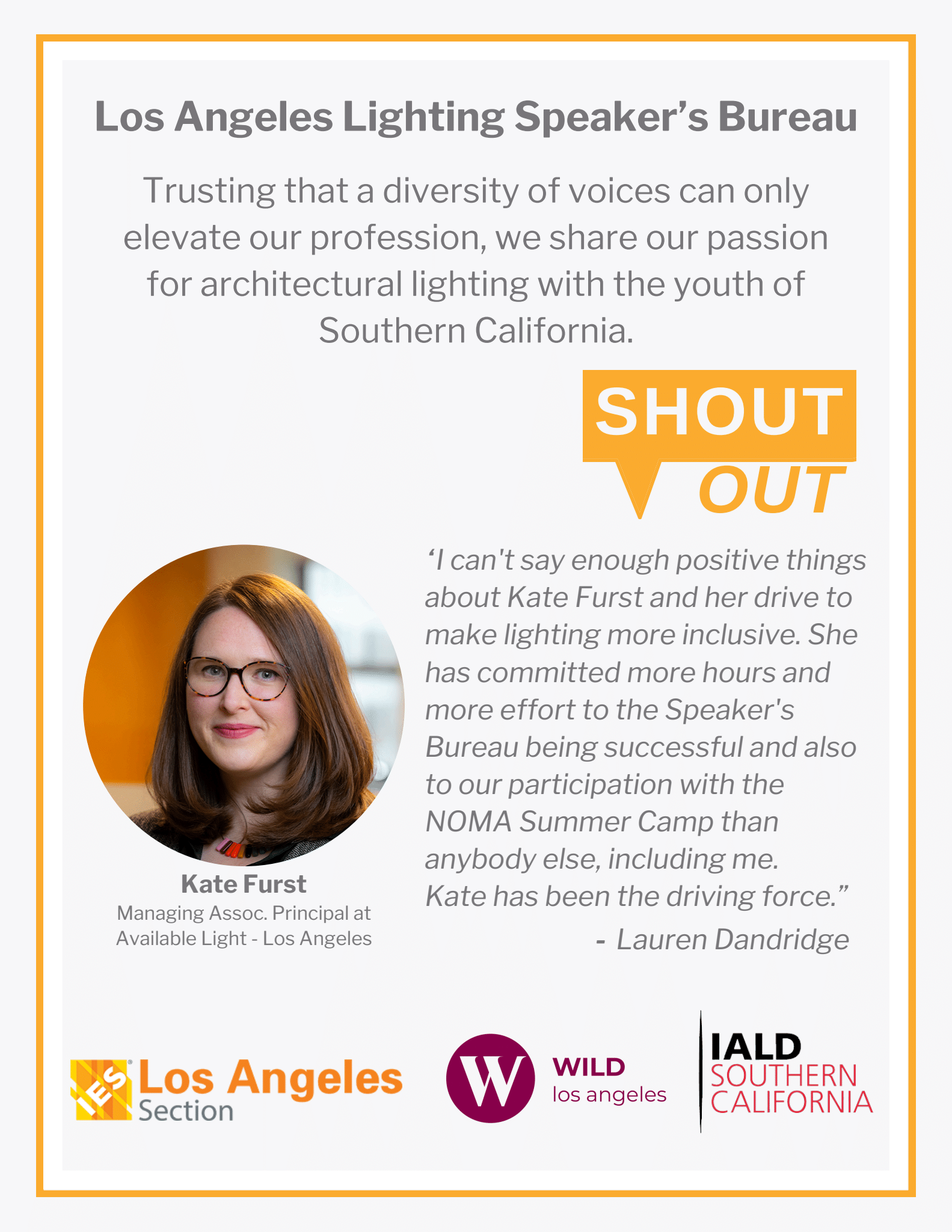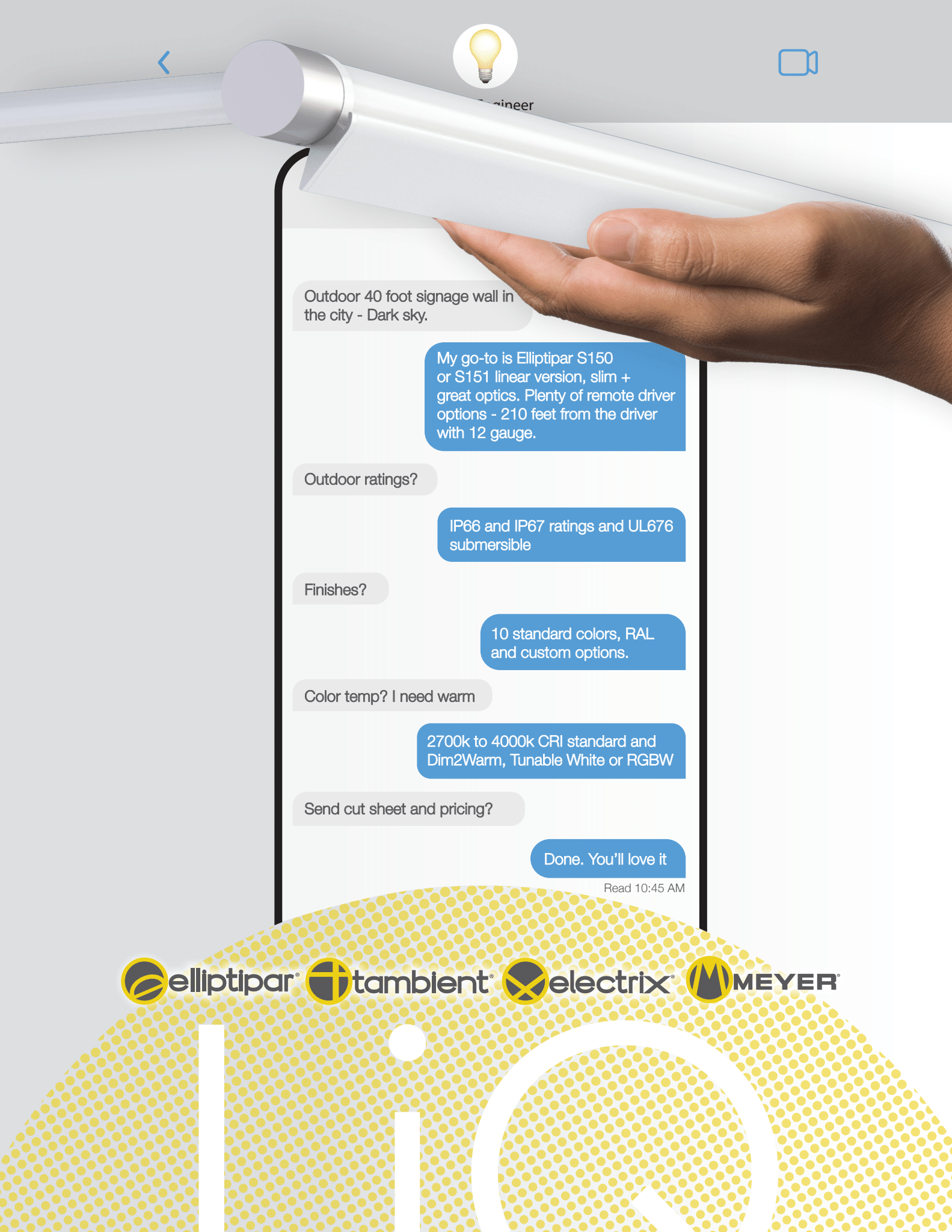
8 minute read
Increasing Representation with Lauren Dandridge
By Kelly Roberts
Cover photo: Lauren giving her keynote, Expanding Our Responsibility, at Light Middle East 2024 for Think Light.
Increasing representation of women in the lighting industry has always been one of the core goals for Women in Lighting and Design (WILD). We understand the importance of visibility to fuel ambition and pave the way for future generations to push harder and further. Lauren Dandridge has had a varied and robust career in the lighting industry, and as her career has grown, so has her understanding of what she represents to others: a Black woman, a mother, an entrepreneur, and a lighting designer. These identities shape narrative, and being labeled based on them can be both empowering - allowing her to connect with others with the shared experience - and restrictive - as focusing on a single one doesn't capture the full scope of her reality.
Lauren's journey into architectural lighting began with a mix of passion and practicality. During middle school, she was captivated by the lighting effects in a production of The Wiz This initial fascination was nurtured by the female theatre teacher, Susan Tanury, who took the time to explain the intricacies of lighting, sparking Lauren's interest in the field. Her education at Northwestern, coupled with internships and roles in entertainment, solidified her expertise and love for lighting. Concerned about the practicality of a post-grad career in theater, she transitioned to architectural lighting where she was guided by mentors like Kathy Pryzgoda and Eileen Thomas. Lauren’s diverse experiences, from working at an electrical engineering firm to becoming a sales representative, have equipped her with both creative and technical skills, making her a versatile and accomplished lighting designer.
Finding Her Mission
During the pandemic, Lauren experienced a period of intense self-reflection. The isolation and upheaval of the pandemic, combined with the social unrest and stark realities of racial injustice, pushed Lauren to reconsider her career trajectory. The catalyst for change came through conversations with her friend Nick Albert which revealed a shared desire to make a meaningful impact through their work. Encouraged by Nick, Lauren began to see the potential in returning to lighting design, not just as a job, but as a way to address larger societal issues. The idea of starting her own firm emerged as a way to both regain control over her professional life and to use her skills to drive positive change.

In 2021 Lauren and Nick founded Chromatic with a mission to address the inequities in urban lighting and to use their expertise to influence how cities look at night, potentially improving urban environments and fostering a greater sense of community safety and pride. This mission-driven approach gives their work a deep sense of purpose which makes the challenges they face more manageable and meaningful. Their partnership is built on a foundation of mutual respect and shared vision. Before launching Chromatic, they had a series of candid and sometimes uncomfortable conversations to ensure their values and expectations aligned. Lauren, a new mother and a Black woman, wanted to make sure Nick, a tall white man, was comfortable with the firm being led by a mission that did not reflect his experience. Nick, understanding the importance of representation and equity, expressed his commitment to supporting Lauren's leadership and using his position to open doors that might otherwise be closed to her.
Struggling for Balance
Starting her own lighting design firm has presented Lauren with significant challenges, particularly as a woman balancing entrepreneurship and family life. One of the foremost difficulties has been managing her time and personal relationships. Lauren acknowledges that while her loved ones express pride in her accomplishments, she struggles with the limited time and flexibility she now has, especially with two children whose schedules demand her attention. Motherhood, she explains, is a particular unpredictable and all-consuming identity. The complexities of motherhood, combined with the demands of running a business, have made it difficult for her to maintain personal connections and ensure her relationships remain strong.
Moreover, Lauren highlights the disparity between her experience and those of her male entrepreneurial peers.

During the pandemic things were just falling apart and I had this feeling that I was not helping to support or uplift my community, so Nick and I really thought about what we could do with the expertise we already had. What we saw is that cities are only using numbers to design, but design is a combination of aesthetics and numbers to find solutions. We wanted to bring a holistic view of the city at night that allows them to make a better composition for communities. We wanted to have those uncomfortable conversations, and stand straight while we did it. It makes the fight easier if you know why you are doing it.

Many of her role models were men whose time was not divided in the same way, leading her to wish there were more women entrepreneurs with similar family dynamics that she could seek advice from. The societal expectations placed on women to manage household responsibilities, care for children, maintain personal health, and still excel professionally add layers of stress and complexity to her role. Lauren’s partnership with Nick required open conversations about these inequalities, ensuring he understood that her contributions might look different but were equally valuable. This acknowledgment and adjustment have been crucial in navigating the intersection of professional aspirations and personal responsibilities.

Sharing Her Love of Lighting
Despite these challenges, Lauren has made significant strides in her career. Over the past twelve years, Lauren has used her role as an adjunct faculty member in the architectural design program at the University of Southern California (USC) to reach many generations of students and increase knowledge of the lighting design profession. In her classes, Lauren emphasizes the significance of lighting as a critical component of architectural design, aiming to instill a deep appreciation for the discipline. She describes her role as twofold: introducing students to the existence and importance of lighting design and encouraging them to consider it as a valuable consultancy service. Her pedagogy involves not only theoretical knowledge but also practical design skills, enabling her students to stand out among their peers. Lauren’s enthusiasm and approachability make her classes engaging and accessible.
Lauren's influence extends beyond the technical aspects of lighting design. As a Black woman in a field where such representation is rare, she provides a powerful example for her students, particularly those of color. She recalls students expressing how much it meant to them to see someone who looks like them excelling in a professional and academic environment. Her presence at USC not only enriches the curriculum but also provides a much-needed perspective on the intersection of gender, race, and professional practice in the design industry.
Commitment to Diversity
Her personal initiatives include involvement in the LA Lighting Speaker's Bureau, an organization dedicated to promoting diversity in lighting conceptualized by Kate Furst, and partnering with organizations like NOMA (National Organization of Minority Architects) to engage with middle and high school students. Lauren pointed out that having people of color, women, and other underrepresented groups in the industry brings in different perspectives, which is vital for comprehensive and successful design. She believes that diversity is not simply about meeting quotas or appearing inclusive, but about enriching the industry with varied viewpoints that can lead to better outcomes.

As Lauren continues to navigate the complexities of her identity, she remains focused on maintaining her craft, enriching her community, and increasing representation and opportunities for underrepresented groups. Lauren is a clear example of the power of visibility and she works tirelessly to ensure that her work and her story serve as an inspiration to others.
Lauren Dandridge, LC, IES
@lauren_dandridge
-------------------------------------
Chromatic, Inc.
@we_are_chromatic
-------------------------------------
Women in Lighting and Design
info@womeninlightinganddesign.org
@womeninlightingannddesign












